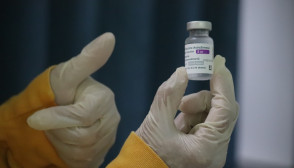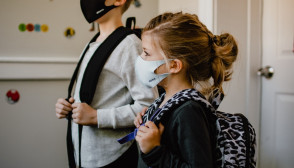NEW YORK (Reuters) - The U.S. government and two of the nation's largest pharmacy chains on Monday began a nationwide campaign to vaccinate nursing home residents against COVID-19, a week after the first vaccines authorized in the country went to healthcare workers.
The program led by Walgreens Boots Alliance Inc and CVS Health Corp is the latest effort to control a pandemic with a staggering U.S. death toll of more than 317,000 lives lost that is straining the capacity of healthcare systems in many states.
The United States now has two authorized vaccines to protect against the virus, one developed by Pfizer Inc and German partner BioNTech SE that was cleared for use on Dec. 11, and one from Moderna Inc that was approved on Friday.
Some 2.9 million shots of the Pfizer/BioNTech vaccine were distributed last week and mostly given to healthcare workers, with about 560,000 people vaccinated as of Sunday afternoon. The first Moderna injections were expected to be administered on Monday.
About 7.9 million doses of the two shots are being distributed nationwide this week, including on Christmas Day if necessary, according to U.S. Army General Gustave Perna, who oversees vaccine distribution through the U.S. Operation Warp Speed program.
Health officials have pleaded with the public to curtail holiday travel and gatherings to avoid adding additional pain and suffering on top of the post-Thanksgiving surge in COVID-19 hospitalizations and deaths.
More than 1,300 long-term care facilities are expected to begin vaccinations on Monday, Perna told a news conference.
About 50 million people in the United States will have had the first of two shots needed for immunization by the end of January, U.S. Health Secretary Alex Azar said.
President-elect Joe Biden is expected to join those ranks on Monday, and plans to receive his shot on camera to boost confidence in its safety.
With supplies limited, many states have put healthcare workers and nursing home residents first in line for vaccinations, in keeping with recommendations from the U.S. Centers for Disease Control and Prevention (CDC).
Older people in nursing homes have accounted for a disproportionate number of COVID-19 deaths.
The U.S. death toll has accelerated in recent weeks to 2,627 per day on a seven-day average, according to a Reuters tally.
The University of Washington's Institute for Health Metrics and Evaluation has said that U.S. COVID-19 deaths will peak in January, when its widely cited model projects that more than 100,000 people will die as the toll marches to nearly 562,000 by April 1.
Despite pleas from officials urging people to stay home over the Christmas holidays, air travel rose over the weekend, according to Transportation Security Administration.
More than 1 million people traveled through U.S. airports on each of Friday, Saturday and Sunday, the most since Nov. 29, the TSA said.
One possible bright spot is that the number of hospitalized COVID-19 patients appears to have leveled off since the middle of last week, with Sunday's total at 113,100, according to a Reuters tally.
MODERNA SHOT PREFERRED BY SOME
Walgreens and CVS in partnership with the federal government aim to vaccinate some 7 million people in more than 70,000 long- term care facilities.
The companies began dosing some residents with Pfizer's vaccine last week, but their full rollout begins on Monday.
Walgreens said it will provide vaccinations this week in about 800 facilities in 12 states. CVS did not specify how many facilities it would visit, but said it also plans to begin administering doses in a dozen states.
Some states have opted to wait for access to the Moderna vaccine, which is easier to transport and store, before vaccinating nursing home residents, the companies said.
Moderna's shots are seen as easier to distribute to hard-to-reach rural areas because they do not need to be kept the ultra-cold temperature required by the Pfizer/BioNTech vaccine.
Both vaccines were about 95% effective at preventing illness in large clinical trials.
In the coming weeks, Walgreens said it plans to vaccinate about 3 million residents and staff at 35,000 long-term care facilities over the coming weeks, while CVS plans to vaccinate around 4 million residents and staff at over 40,000 such facilities.
On Sunday, outside advisers to the CDC recommended that 30 million frontline essential workers should be the next group to receive priority for vaccination, including first responders, teachers, public transit staff and grocery store workers.
(Reporting by Carl O'Donnell and Richa Naidu; Additional reporting by Michael Erman in Maplewood, New Jersey, Peter Szekely in New York and Lisa Baertlein in Los Angeles; Editing by Daniel Wallis, Steve Orlofsky and Bill Berkrot)










